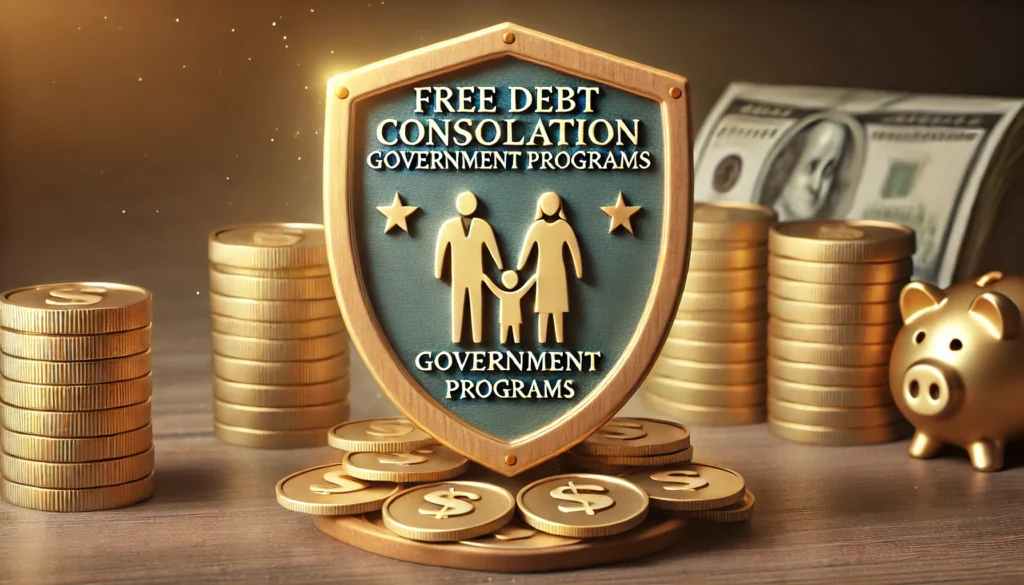Understanding the Burden of Student Debt
Student debt has become one of the most pressing financial challenges facing graduates today. With the rising cost of education, millions of borrowers struggle to meet their repayment obligations, often juggling multiple loans with varying interest rates and repayment terms. This financial strain not only affects their ability to save for the future but also limits career choices, homeownership, and overall economic mobility. Many borrowers find themselves trapped in a cycle of debt that seems impossible to escape. Understanding the options available for managing student debt is crucial to achieving financial freedom and stability.
You may also like: Federal Direct Consolidation Loan: A Smart Strategy to Simplify Student Debt
Fortunately, there are free debt consolidation government programs that aim to alleviate the burden of student loans. These programs offer structured solutions to consolidate multiple loans into a single, more manageable payment. By utilizing these government-backed programs, borrowers can simplify their repayment process, potentially secure lower interest rates, and improve their financial outlook. However, navigating these options can be complex, and many graduates remain unaware of the full range of benefits available to them. This article will explore the various government programs designed to help with student debt consolidation and how borrowers can maximize these opportunities to move towards a debt-free future.

How Free Debt Consolidation Government Programs Work
Debt consolidation programs offered by the government function by merging multiple loans into a single loan with uniform repayment terms. The primary advantage of these programs is that they often provide lower interest rates, extended repayment periods, and, in some cases, loan forgiveness options. Unlike private consolidation loans, government-backed consolidation programs maintain federal protections, such as income-driven repayment plans and deferment or forbearance options.
The process begins with evaluating the different loans a borrower holds, determining eligibility, and applying for a government debt consolidation program. Once accepted, the borrower’s existing student loans are paid off, and a new loan is issued, which the borrower then repays under the new terms. This not only simplifies financial management but also reduces the risk of missed payments and default. Borrowers who take advantage of these programs can regain control over their financial situation and develop a sustainable plan for repaying their student debt.

Federal Direct Consolidation Loan: The Primary Government Debt Consolidation Option
One of the most widely utilized free debt consolidation government programs is the Federal Direct Consolidation Loan. This program allows borrowers to combine multiple federal student loans into a single loan with a fixed interest rate based on the weighted average of the original loans. This consolidation simplifies the repayment process by reducing the number of monthly payments and extending the repayment period, making it easier to manage debt over time.
A major benefit of this program is that it grants continued access to federal repayment benefits, such as income-driven repayment plans and Public Service Loan Forgiveness (PSLF). Borrowers who previously held loans with varying interest rates can potentially lower their overall monthly payments through consolidation. However, it is important to note that while consolidation can reduce the complexity of loan repayment, it may result in increased total interest payments over the life of the loan due to extended repayment terms. Careful consideration should be given before proceeding with consolidation to ensure that it aligns with long-term financial goals.

Advantages and Disadvantages of Government Debt Consolidation Programs
While government debt consolidation programs offer substantial benefits, it is essential to weigh the pros and cons before making a decision. On the positive side, borrowers benefit from a streamlined repayment process, potential access to lower monthly payments, and continued eligibility for federal protections. Additionally, those enrolled in income-driven repayment plans may find that consolidation provides them with new, more flexible repayment options tailored to their financial circumstances.
However, there are also drawbacks to consider. Consolidation may result in the loss of certain borrower benefits associated with individual loans, such as interest rate discounts or principal rebates. Additionally, extending the repayment term can lead to higher overall interest costs. Borrowers should carefully assess their financial goals and consult with financial advisors or loan servicers before committing to a consolidation program. Understanding the full implications of consolidation ensures that borrowers make informed decisions that align with their financial well-being.
Navigating the Application Process for Debt Consolidation Government Loans
Applying for a government debt consolidation loan requires careful attention to detail to ensure eligibility and maximize benefits. The process begins by gathering all relevant loan information, including outstanding balances, interest rates, and repayment terms. Borrowers can then apply for a Federal Direct Consolidation Loan through the U.S. Department of Education’s website, where they will be required to select a new repayment plan.
During the application process, borrowers must choose whether to retain their existing repayment plan or switch to an income-driven plan, which can provide additional relief based on income levels. The approval process typically takes several weeks, and once completed, the new consolidated loan replaces the previous individual loans. It is crucial to continue making payments on existing loans until confirmation of consolidation approval to avoid potential late fees or credit damage.
Credit Card Relief Grants and Their Role in Student Debt Solutions
While credit card relief grants are not directly related to student loans, they play an essential role in the broader conversation about debt management. Many graduates accumulate credit card debt in addition to student loans, exacerbating their financial burden. Credit card relief grants, which provide financial assistance to individuals struggling with credit card debt, can help borrowers free up funds that can then be redirected towards student loan repayment.
These grants, offered by various nonprofit organizations and government initiatives, aim to assist borrowers in managing their overall debt load more effectively. By reducing high-interest credit card balances, individuals can improve their financial stability and focus on long-term goals, such as eliminating student loan debt. Exploring all available debt relief options, including credit card relief grants, ensures a comprehensive approach to financial wellness.
Frequently Asked Questions
1. What are the key benefits of a debt consolidation program?
A debt consolidation program offers several advantages beyond just simplifying your payments. It can help improve your credit score over time by reducing your credit utilization ratio, an important factor in credit scoring models. Additionally, it can provide financial relief by lowering your interest rates, which means you pay less in the long run. Many borrowers also find that having a structured repayment plan reduces financial stress and improves their ability to budget effectively. If you qualify for free debt consolidation government programs, you may also benefit from lower fees and more lenient repayment terms.
2. How do free debt consolidation government programs differ from private options?
Free debt consolidation government programs are designed to provide financial relief without high service fees, making them a more affordable alternative to private programs. These government-backed options often come with lower interest rates and longer repayment terms, reducing the monthly financial burden on borrowers. Additionally, they may offer eligibility for credit card relief grants, which can further reduce your overall debt obligations. Unlike private consolidation plans, government programs focus on long-term financial stability rather than immediate profit. However, they often have stricter qualification requirements, so it’s essential to research which option best suits your financial situation.
3. Can I qualify for a credit card relief grant through a debt consolidation program?
Yes, in some cases, you may be eligible for a credit card relief grant if you enroll in a debt consolidation program. These grants are designed to help individuals reduce their outstanding credit card debt without taking on additional loans. To qualify, you typically need to demonstrate financial hardship and a genuine need for assistance. While not all debt consolidation government loans offer grant options, certain government-backed initiatives provide partial or full debt relief through grants. It’s best to check with official government resources to see if you meet the eligibility criteria for such programs.
4. How do debt consolidation government loans impact my credit score?
Debt consolidation government loans can positively or negatively affect your credit score, depending on how you manage them. Initially, applying for a new loan may cause a slight dip in your credit score due to the hard inquiry on your report. However, once you begin making consistent payments, your score may improve as your credit utilization decreases. Additionally, by paying off multiple high-interest debts with a single, lower-interest loan, you reduce the risk of missed payments, which can have a long-term positive impact. Over time, responsible use of a debt consolidation program can significantly strengthen your credit profile.
5. What factors determine eligibility for free debt consolidation government programs?
Eligibility for free debt consolidation government programs is typically based on several key factors, including your income level, debt-to-income ratio, and financial hardship status. Some programs may require proof that you are struggling with high-interest debt and are unable to make your current payments. Additionally, your credit history and past payment behavior may influence whether you qualify for specific government-backed loans. Unlike private lenders, government programs often prioritize individuals in severe financial distress rather than those with good credit scores seeking lower interest rates. Checking the specific criteria for each program is crucial to determining your eligibility.
6. Are there any risks associated with debt consolidation government loans?
While debt consolidation government loans offer significant benefits, they also come with potential risks. One concern is that consolidating your debts into a single loan might extend your repayment period, leading to higher overall interest payments in the long run. Additionally, if you fail to make timely payments, you could face penalties or damage to your credit score. Some borrowers may also find that they qualify for lower loan amounts than their total debt, requiring them to manage multiple payments despite consolidation efforts. Careful financial planning is essential to ensure that a debt consolidation program truly aligns with your financial goals.
7. How do I determine if a debt consolidation program is the right choice for me?
Deciding whether to enroll in a debt consolidation program requires a careful evaluation of your financial situation. If you struggle with multiple high-interest debts and find it challenging to keep up with payments, consolidation can provide relief by simplifying your repayment structure. Additionally, if you qualify for free debt consolidation government programs, you may benefit from lower costs and extended repayment terms. However, if your debts are already manageable, or if consolidation would increase your total interest paid over time, alternative strategies such as budgeting or negotiating lower interest rates directly with creditors may be more suitable.
8. What are the alternatives to debt consolidation government loans?
If you do not qualify for debt consolidation government loans or prefer alternative solutions, several other debt management strategies exist. One option is negotiating with creditors to secure lower interest rates or extended repayment terms. Another approach is enrolling in a nonprofit credit counseling program, which can provide financial education and assistance in managing your debt. Balance transfer credit cards with low introductory interest rates may also be a viable option for those with good credit. Additionally, exploring a credit card relief grant may help reduce your debt burden without taking on new loans. Each alternative has pros and cons, so it’s essential to choose the best fit for your financial needs.
9. Can a debt consolidation program help me avoid bankruptcy?
Yes, a well-structured debt consolidation program can often help individuals avoid bankruptcy by making their debts more manageable. By combining multiple debts into a single, lower-interest payment, borrowers can regain financial stability without resorting to extreme measures. Additionally, free debt consolidation government programs may provide financial assistance that reduces overall debt obligations. Bankruptcy should typically be considered a last resort, as it can have severe and long-lasting effects on your credit score. If you are considering bankruptcy, consulting with a financial advisor or credit counselor before making a decision is highly recommended.
10. How can I ensure success in a debt consolidation program?
Successfully completing a debt consolidation program requires discipline, commitment, and financial planning. Start by creating a realistic budget that prioritizes your consolidated loan payments. Take advantage of financial education resources offered by free debt consolidation government programs to improve your money management skills. Avoid taking on new debt while in the program, as this can undermine your progress. Additionally, regularly monitor your credit report to track improvements and address any errors. By staying proactive and committed, you can achieve financial stability and long-term debt relief through consolidation.
Conclusion: Achieving a Debt-Free Future Through Government Programs
Managing student debt can be overwhelming, but free debt consolidation government programs provide valuable solutions to help borrowers regain control of their finances. The Federal Direct Consolidation Loan offers a structured path to simplify repayment while maintaining federal protections and potential loan forgiveness options. By carefully evaluating consolidation opportunities, exploring income-driven repayment plans, and considering additional debt relief resources such as credit card relief grants, borrowers can develop a sustainable strategy for financial freedom.
A debt-free future is possible with informed decision-making and proactive financial management. Understanding and utilizing government debt consolidation programs ensures that graduates can navigate the challenges of student debt efficiently and effectively. By taking advantage of these opportunities, borrowers can work towards a more secure financial future, free from the burdens of overwhelming student loans.
student loan relief, financial planning for graduates, loan forgiveness programs, student debt consolidation, federal loan options, repayment strategies, debt management solutions, credit relief assistance, financial literacy, personal finance planning, graduate financial success, managing student loans, loan repayment assistance, financial independence, credit management, interest rate reduction, public service loan forgiveness, government financial aid, debt reduction strategies, income-driven repayment plans
Further Reading:
Government debt help schemes and solutions
The information provided in this article is for general informational purposes only and is not intended to constitute financial, investment, legal, tax, or other professional advice. The content should not be relied upon for making any financial or investment decisions. Readers are encouraged to consult with licensed professionals, such as financial advisors, attorneys, or tax experts, to obtain personalized advice tailored to their individual circumstances. The author and publisher disclaim any liability for any actions taken or not taken based on the information provided in this article.





